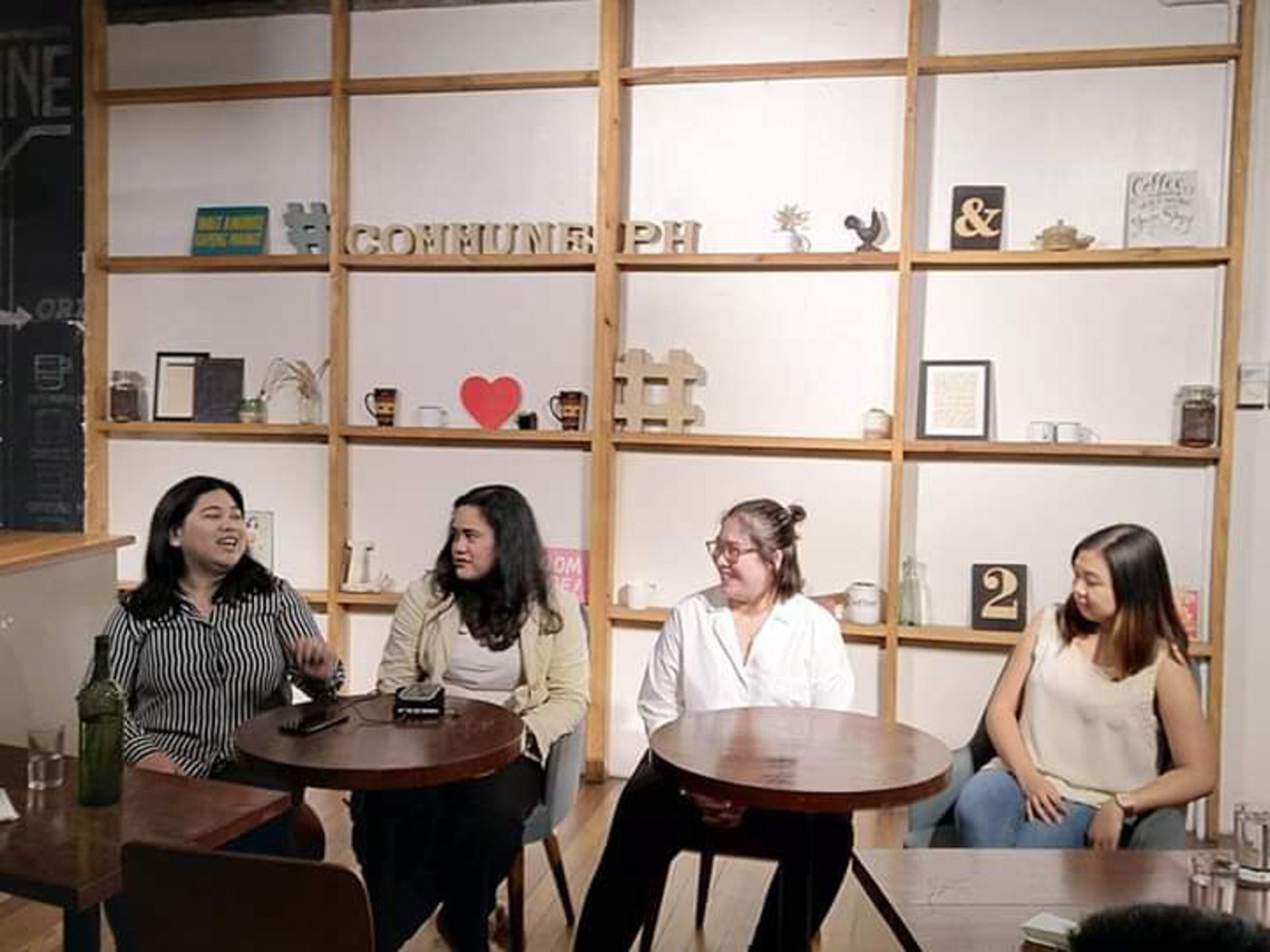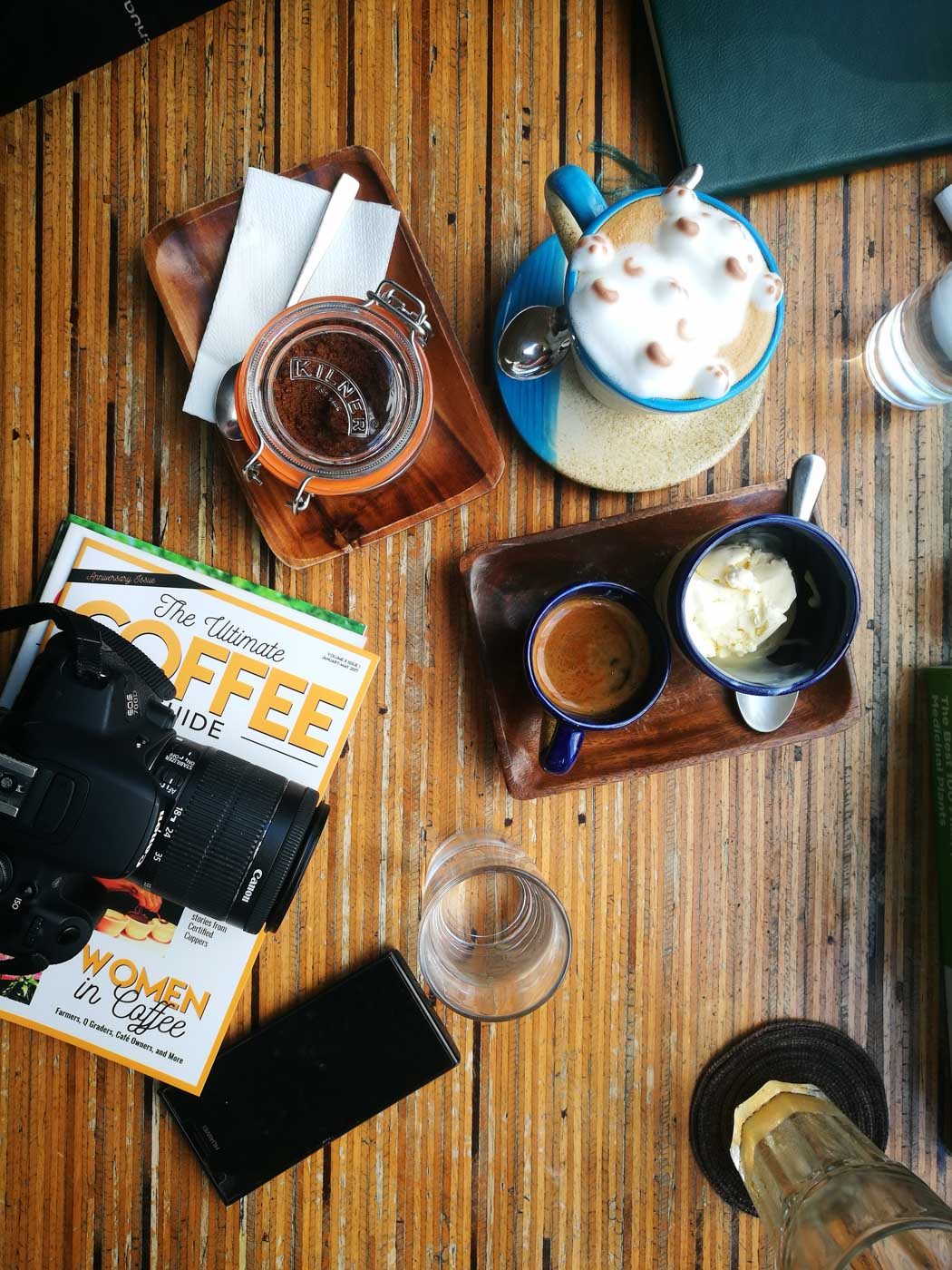SUMMARY
This is AI generated summarization, which may have errors. For context, always refer to the full article.

Gathered by the same interest, bonded by shared goals. Such is the mantra of Women in Coffee, an event that celebrated female roles in a male-dominated industry.
Meet Bettina Grace Belardo, the Q Robusta Grader, coffee producer, and café owner; Vanessa Caceres, the first Philippine female barista champion; Jenn Tan the IT professional-turned-coffee shop owner; and Iana Peralta, the coffee enthusiast and barista wannabe.
This Philippine Coffee Month, Commune – a coffee shop in Makati that proudly serves only Philippine coffee – welcomed these women for a night of casual chatting, listening, and storytelling.
Here are their stories.
Bettina “Bea” Grace Belardo
Third-generation producer, certified Q-Grader
Bea started helping her father manage their roaster at Belardo Coffee Enterprises in Cavite. Now she has her own coffee shop, Café Belardo.
While she’s been exposed to their business since childhood (she has fond memories of playing on a pile of coffee sacks), she said she’s still new in the industry. So she keeps on learning, from being barista-trained to being a Q-grader.
The latter is her best coffee moment so far, which takes a 3-day intensive training and is like a simulation of the actual exam on the last 3 days. Participants should be able to use their senses to evaluate the coffee on the table through cupping. The Specialty Coffee Association of America (SCAA) has set various standards to ensure that everyone is on the same page when evaluating the coffee.
Rosario Juan, the event moderator and Commune co-owner, summed up for Bea why the Q Robusta (R) exam is harder to pass, that is, “because the flavor profile of Robusta coffee is less defined (less apparent) than that of Arabica.”
Still, Bea felt the pressure of passing the Q Arabica Grader course because she was the only woman examinee. After the announcement of results, the moderator told her she was a good taster.
For Bea, that drives her to do better.
“While I did not pass the A exam, I got certified R Grader. Kaya ko pala (I can do it after all),” she said.
She hopes there will be more women of her age in the industry.
“Ang mga kahalubilo ko are in my father’s generation (The people in my business circle are of my father’s generation),” Bea said, adding that for every 10 people she would meet, there would only be two women in the group.
Vanessa “Vian” Caceres
Barista champion, mentor
Being a barista has opened many opportunities for Vian.
She represented the Philippines at the first Female Barista All Stars event in Bogota, Colombia in 2015, after winning in the Philippine Barista Champion in 2008.
She became a scholar of International Women’s Coffee Alliance (IWCA), which she said she wasn’t aware of at first. “I didn’t know there are opportunities like this,” she shared.
Now, she’s the manager and head barista of The Coffee Academics in Singapore, and one of the founders of this vibrant coffee community in Facebook called Latte Art Philippines.
Majority of baristas are men, and even when there were comments like “babae ‘yan eh” (but that’s a lady barista) when she won the championship, she did not allow those to deter her.
“Then why did I win? I even made it to the international competition,” she said with pride.
For Vian, it’s important to assert your worth. Don’t be afraid to ask questions, she urged.
Rosario agreed with her, and added that when you assert yourself a little in a more positive way, you’ll see the difference.
“Eh ako makapal ang mukha ko (But I’m very assertive),” Vian said.

Iana Peralta
Coffee enthusiast, home brewer
Iana wants to be a barista. She applied once, but did not push through with it. When Rosario learned about it, she quickly told Iana, “apply ka sa amin (send us your resume).” As of this writing, Rosario said Iana has already started her part-time stint.
During the event, Rosario said one of the reasons why there are more male baristas is because there are no women applicants.
For Vian who is also a mentor to baristas here and abroad, “madali lang naman maging barista (it’s easy to be a barista).” She said one only has to develop his or her own style, and do that consistently over and over again.
But she warned about copying someone else’s style. She used two distinct Filipino dishes as example to prove her point, “Kung paksiw siya, dapat ang sa’yo sinigang. (If hers is vinegary, yours can be sour and savory).”
Vian said if a barista gets a question like “Ba’t ang asim ng kape ‘nyo? (Why is your coffee too sour?),” just say it’s the level of acidity. According to Vian, keeping them informed helps them enjoy their coffee of choice.
Iana, ever the coffee enthusiast, promotes the coffee scene in the country by rounding up coffee shops in a particular area. Based on her observation and experience, there is still a lack of content about Philippine coffee here.
When she went to Indonesia, for example, she was able to sample local coffee. She also came across a social media group that promotes their local beans.
Iana said the country needs more content about Philippine coffee just as it needs more coffee shops specializing in Philippine coffee.
“I still dream of becoming a barista,” she said, adding that she still needs to improve on her tasting skills because “may nalalasahan ako, pero hindi ko ma-identify (I can taste certain flavors, but I can’t identify them yet).”
“Nakalasa lang ako once sinigang (Once, I’ve tasted sinigang),” she added.
Jenn Tan
Freelance I.T. professional, full-time café owner
Jenn admitted to something she’s guilty of: being into imported beans. Jenn explained that the availability of suppliers and the training they provide are an attractive combination one can’t help but grab, especially if you’re a small-time player.
And who can blame her, when in the Philippines, the supply can hardly meet the demand. “We are a coffee-consuming country but we produce so little,” Rosario explained.
The country produces 35,000 metric tons a year, yet consumes 180,000 metric tons. Imagine the difference.
The supply for specialty coffee is much less. But the good news is, there have been developments in the Philippine specialty coffee industry. The interest is there, and so are the consumers’ awareness.
Five years ago, Rosario said people used to be skeptical of the quality of Philippine coffee. Rosario would defend that there are quality local coffee, one only has to know where to find them.
Today, Rosario said people ask her about the price, “Why does it cost the same (or even higher) than imported coffee?”
She said one has to look at the economics of Philippine coffee to answer such questions; for one, it’s intensive to produce specialty coffee.
Rosario then urged people to make a conscious effort of paying premium for local coffee and every quality local products. By doing so, local farmers reap the economic benefits of a superior product.
When it comes to all-male business organizations which help men accelerate their success, Jenn thinks women can create their own too. She said our need to belong, to organize, and to build minute connections are good starting points.
In some instances, women are a welcome mix. Vian shared her experience with the Latte Art group, which is male-dominated. She said they want a woman in the mix of founders to serve as their “attorney.”
Can women have it all?
As a family woman and entrepreneur, Jenn admitted she will always put marriage first. However, that does not mean that she will not make goals for herself.
In fact, she has already started a new coffee project: a specialty coffee cart service for weddings, parties and corporate events.
For Iana, it’s just a matter of finding time for your goals. Bea, for her part, said it’s about sticking to your goals and achieving them one at a time.
It’s possible, if women set their priorities right and know that they’re into something by choice. Ultimately, women don’t have to do it all alone when they have supportive peers – women or not. – Rappler.com
Add a comment
How does this make you feel?
There are no comments yet. Add your comment to start the conversation.